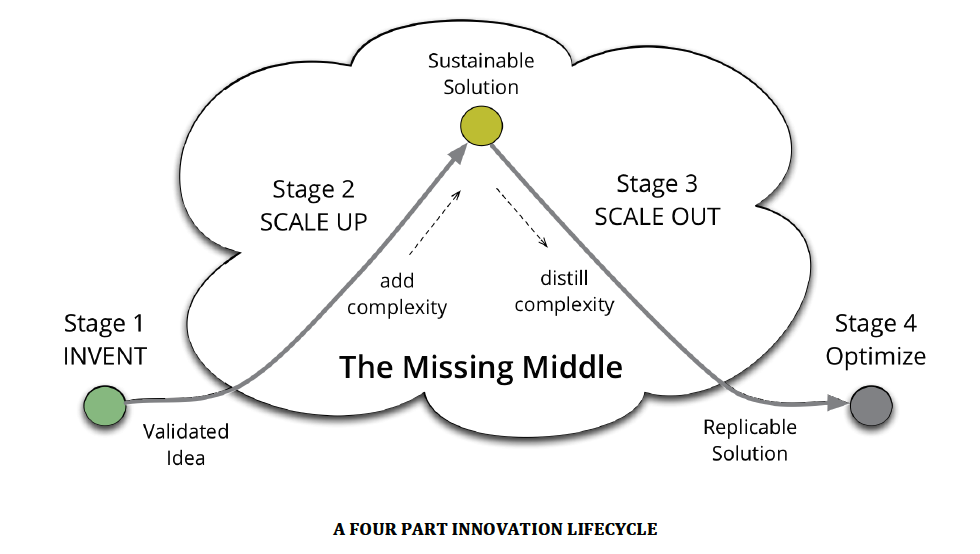Disclaimer: The statements and opinions expressed in this article are those of the author(s) and do not necessarily reflect the positions of Thoughtworks.

This white paper is written by Dan McClure (Innovation Design Practice Leader, Thoughtworks) and Ian Gray (Director, Gray Dot Catalyst). This is the second of four contributions on the subject of 'Innovation Scaling' submitted for the 'Transformation Through Innovation' theme for the World Humanitarian Summit. You can read the first and third parts here.
The premise of our initial paper, The Missing Middle of Innovation, was that Humanitarian innovations frequently fail to go to scale because innovation teams are in fact confronting fundamentally new problem domains. They must now Scale Up and Scale Out their programs.
This work is very different from the fast moving exploration practiced during pilot innovation. Funders and their teams need to set aside many of the most popular techniques for early stage innovation and replace them with a new perspective and appropriately tailored tools.
Once a pilot program has proven itself, the innovation team must incorporate complexity that was previously ignored, during the fast moving pilot stage. While there are some common principles shared with lightweight prototyping, there are good reasons for the structure and management of Scale Up engagements to be quite different.
Scaling requires us to directly engage with the complexity of wicked problems. This paper explores Scale Up’s distinctly unique innovation management needs. The nature of the work, type of leadership, form of engagement and tools for measuring success must all be tailored to the job of constructing a sustainable solution in the real world.
There is a growing body of research on innovations in numerous sectors including Cash, Programming, Health, Shelter, WASH and Digital solutions. They include many stories that provide anecdotal insights into the innovation journey.
What they generally do not do, is construct a practical guide for action that is rooted in a thinking model. There is little help for the funder or practitioner when it comes to structuring, decision making and management of Scale Up initiatives. We hope to start filling those gaps.
Two follow up papers are planned. One looks more closely at the complex design challenges that exist for Scaled Up solutions. The other explores the challenge of replicating solutions (Scaling Out) once a scaled up solution is in place.
To read the complete white paper, download the PDF here.
Disclaimer: The statements and opinions expressed in this article are those of the author(s) and do not necessarily reflect the positions of Thoughtworks.
Thoughtworks acknowledges the Traditional Owners of the land where we work and live, and their continued connection to Country. We pay our respects to Elders past and present. Aboriginal and Torres Strait Islander peoples were the world's first scientists, technologists, engineers and mathematicians. We celebrate the stories, culture and traditions of Aboriginal and Torres Strait Islander Elders of all communities who also work and live on this land.
As a company, we invite Thoughtworkers to be actively engaged in advancing reconciliation and strengthen their solidarity with the First Peoples of Australia. Since 2019, we have been working with Reconciliation Australia to formalize our commitment and take meaningful action to advance reconciliation. We invite you to review our Reconciliation Action Plan.
